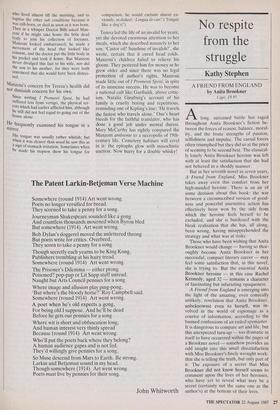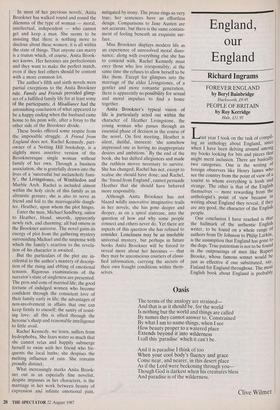No respite from the struggle
Kathy Stephen
A FRIEND FROM ENGLAND by Anita Brookner Cape, £9.95
■fr
Along, sustained battle has raged throughout Anita Brookner's fiction be- tween the forces of reason, balance, moral- ity, and the brute strengths of passion, selfishness and impulse. The carnal forces often triumphed but they did so at the price of seeming to be second best. The classical- ly lonely Anita Brookner heroine was left with at least the satisfaction that she had not behaved in a shoddy manner.
But in her seventh novel in seven years, A Friend from England, Miss Brookner takes away even this comfort from her high-minded heroine. There is an air of some decision about this book: the war between a circumscribed version of good- ness and powerful insensitive action has effectively been won by the side from which the heroine feels herself to be excluded, and she is burdened with the bleak realisation that she has, all along, been wrong, having misapprehended the strategy and what was at stake.
Those who have been wishing that Anita Brookner would change — having so thor- oughly become Anita Brookner in her successful, compact literary career — may feel some satisfaction that, in this novel, she is trying to. But the essential Anita Brookner heroine — in this case Rachel Kennedy, aged 32 — remains a character of fascinating but infuriating opaqueness.
A Friend from England is emerging into the light of the amazing, even comically unlikely, revelation that Anita Brookner, unbeknownst even to herself, was in- volved in the world of espionage as a courier of information, according to the banned confessions of an exiled spymaster. It is dangerous to compare art and life, but this unexpected turn-up — too dramatic in itself to have occurrred within the pages of a Brookner novel — somehow provides an odd insight into this small dissatisfaction with Miss Brookner's finely wrought work: that she is telling the truth, but only part of it. The exposure of a secret that Miss Brookner did not know herself seems to comment upon the lives of her heroines, who have yet to reveal what may be a secret (certainly not the same one as the author's) at the bottom of their lives. In most of her previous novels, Anita Brookner has walked round and round the dilemma of the type of woman — moral, intellectual, independent — who cannot get and keep a man. She seems to be insisting that there is nothing more to disclose about these women; it is all within the state of things. That anyone can marry is a truism which, of course, Anita Brook- ner knows. Her heroines are perfectionists and they want to make the perfect match, even if they feel others should be content with a more common lot.
The author's fifth and sixth novels were partial exceptions to the Anita Brookner rule. Family and Friends provided glimp- ses of a fulfilled family life for at least some of the participants; A Misalliance had the astonishing conclusion of what appeared to be a happy ending when the husband came home to his prim wife, after a foray to the other side of the Brookner divide.
These books offered some respite from the impossible struggle. A Friend from England does not. Rachel Kennedy, part- owner of a Notting Hill bookshop, is a slightly more assertive version of the Brookneresque single woman without family of her own. Through a business association, she is gratefully drawn into the lives of a 'successful but melancholy fami- ly', the Livingstones, of Wimbledon and Marble Arch. Rachel is included almost within the holy circle of this family as an altruistic gesture; she is also to serve as friend and foil to the marriageable daugh- ter, Heather, upon whom the plot hinges.
Enter the man, Michael Sandberg, suitor to Heather, blond, smooth, apparently newly rich, and charming: all bad omens in the Brookner universe. The novel gains its energy of plot from the gathering mystery surrounding Michael and the suspense with which the family's reaction to the revela- tion of his character is awaited.
But the particulars of the plot are in- cidental to the author's mastery of descrip- tion of the rising and ebbing of emotional tension. Rigorous examinations of the narrator's state of singleness are presented. The pros and cons of married life; the good fortune of indulged women who become confident through the consistent love of their family early in life; the advantages of non-involvement in affairs that one can keep firmly to oneself; the sanity of resist- ing love: all this is sifted through the heroine's sharp and reasonable intelligence to little avail.
Rachel Kennedy, we learn, suffers from hydrophobia. She fears water so much that she cannot relax and happily submerge herself to swim with her friend who fre- quents the local baths; she despises the melting influence of rain. She remains proudly distinct.
What increasingly marks Anita Brook- ner out as an especially fine novelist, despite impasses in her characters, is the marriage in her work between beauty of expression and infinite emotional pain, mitigated by irony. The prose rings so very true; • her sentences have an effortless design. Comparisons to Jane Austen are not accurate, but there is the same contain- ment of feeling beneath an exquisite sur- face.
Miss Brookner displays modem life as an experience of unresolved moral disso- nance: along with everything else she has to contend with, Rachel Kennedy must envy those who live irresponsibly; at the same time she refuses to allow herself to be like them. Except for glimpses into the marriage of the elder Livingstones, of a gentler and more romantic generation, there is apparently no possibility for sexual and moral impulses to find a home together.
Anita Brookner's typical vision of life is particularly acted out within the character of Heather Livingstone, the young woman who passes through an essential phase of decision in the course of the novel. On first meeting, Heather is silent, dutiful, innocent: 'she somehow impressed one as having no inappropriate desires and ambitions.' By the end of the book, she has shifted allegiances and made the ruthless moves necessary to survive. She has changed; Rachel has not, except to realise she should have done; and Rachel, the 'friend from England', cannot persuade Heather that she should have behaved more responsibly.
Although Anita Brookner has not blazed wildly innovative imaginative trails in her novels, she has gone deeper and deeper, as on a spiral staircase, into the question of how and why some people connect and others never do. Yet there are aspects of this question she has refused to consider. Loneliness may be an insoluble universal mystery, but perhaps in future books Anita Brookner will be forced to reveal more about her heroines — that they may be unconscious couriers of classi- fied information, carrying the secrets of their own fraught conditions within them- selves.











































 Previous page
Previous page